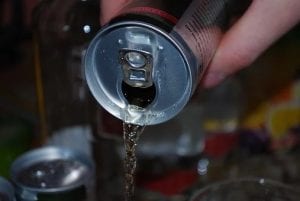Written by Chrystal Moulton, Staff Writer. Study found that caffeine-induced glucose tolerance is affected by an individual’s genetics and that adolescents who consumed caffeinated energy shots with a carbohydrate load had lowered insulin sensitivity.
 Energy drinks are a popular alternative to coffee among adolescents 1. These products however contain higher concentration of caffeine and can pose a significant risk to adolescents 2. Furthermore, studies have demonstrated that consumption of caffeinated energy drinks together with a carbohydrate load can significantly impair glucose metabolism 3,4 as observed thru oral glucose tolerance tests and reduced insulin sensitivity 5. However, individual responses to the co-administration of caffeinated energy drinks and carbohydrate load varies, implying some genetic contribution to this phenomenon. In the current study, researchers investigated the effect of co-consumption of a caffeinated energy drink and carbohydrates on glucose metabolism in adolescents 6.
Energy drinks are a popular alternative to coffee among adolescents 1. These products however contain higher concentration of caffeine and can pose a significant risk to adolescents 2. Furthermore, studies have demonstrated that consumption of caffeinated energy drinks together with a carbohydrate load can significantly impair glucose metabolism 3,4 as observed thru oral glucose tolerance tests and reduced insulin sensitivity 5. However, individual responses to the co-administration of caffeinated energy drinks and carbohydrate load varies, implying some genetic contribution to this phenomenon. In the current study, researchers investigated the effect of co-consumption of a caffeinated energy drink and carbohydrates on glucose metabolism in adolescents 6.
In a randomized double-blind crossover study, researchers recruited 20 adolescents (10 males, 10 females) aged 13-19 years to assess the effect of a caffeinated energy drink on insulin sensitivity and glucose regulation. Upon parental consent, the subjects underwent an oral glucose tolerance test. They were instructed to record and consume the same food prior to trial. Test beverages used were 5-hr Energy Decaffeinated and 5-hr Energy Regular Strength (both beverages were sugar free). Participants were not allowed to do any exercise or consume any caffeine 24hrs before the trail. Ten participants were randomly assigned to both the DECAF and CAF groups. Fasting blood sample was taken upon arrival and immediately after participants consumed the test beverage. After 40 minutes, a 2nd blood sample was taken followed by consumption of a glucose drink (Trutol, 1.7 5g/kg body weight). Following ingestion of the glucose drink, blood samples were taken at 30, 45, 60, 90, and 120 min. After 1-4weeks washout period, subjects were crossed-over to the opposite protocol and corresponding steps were repeated. Participants also provided saliva samples to assess genetic influence on glucose response.
No significant effects for BMI, age, or sex were observed. Average age of participants was 16.4 ± 2.2 years among males and 17.5 ± 2.2 years among females. All participants exercised regularly and 85% reported regular consumption of caffeine. Following oral glucose tolerance test, researchers found participants assigned to the caffeinated group had 25% increases in glucose concentration compared with decaf group (AUC: 683.8 ± 31.4 mmol/L @120min versus 556.9 ± 26.8 mmol/L @120 min, p<0.0001, respectively). Researchers also observed a 26% increase in insulin in the caffeinated group compared to decaf group (AUC: 52,324.5 ± 7371.2 pmol/L @ 120 min versus 42,437.2 ± 4711.1 pmol/L @120 min, p= 0.037, respectively). Insulin sensitivity was significantly lower in the caffeinated group compared to decaf group (Insulin sensitivity index [ISI]: 4.62 ± 0.45 versus 5.66 ± 0.48, p= 0.0016, respectively). Concentration of caffeine at 120 min was 22.9 ± 1.5 µmol/L in the caffeinated group (compared to decaf group 0.31 ± 0.5 µmol/L, p<0.001). No differences were observed for leptin, glucagon, ghrelin, GIP, GLP-1, or PYY between treatment groups. Genetic analysis revealed participants with the allele for fast metabolism of caffeine experienced higher glucose intolerance compared to those with allele for slow caffeine metabolism (p<0.05).
Overall, the study showed that caffeine consumption (in the form of a sugar free energy shot) in combination with carbohydrates reduces insulin sensitivity in adolescents while increasing both glucose and insulin serum concentration. A larger sample size is needed to further support the findings in this study. Further studies would also need to consider how diet and caffeine consumption could affect glucose regulation in adolescents.
Source: Shearer, Jane, Raylene A. Reimer, Dustin S. Hittel, Mackenzie A. Gault, Hans J. Vogel, and Matthias S. Klein. “Caffeine-Containing Energy Shots Cause Acute Impaired Glucoregulation in Adolescents.” Nutrients 12, no. 12 (2020): 3850.
© 2020 by the authors. Licensee MDPI, Basel, Switzerland. This article is an open access article distributed under the terms and conditions of the Creative Commons Attribution (CC BY) license (http://creativecommons.org/licenses/by/4.0/).
Click here to read the full text study.
Posted February 23, 2021.
Chrystal Moulton BA, PMP, is a 2008 graduate of the University of Illinois at Chicago. She graduated with a bachelor’s in psychology with a focus on premedical studies and is a licensed project manager. She currently resides in Indianapolis, IN.
References:
- Reid JL, McCrory C, White CM, et al. Consumption of Caffeinated Energy Drinks Among Youth and Young Adults in Canada. Prev Med Rep. 2017;5:65-70.
- Schneider MB, Benjamin HJ, Bhatia JJ, et al. Sports drinks and energy drinks for children and adolescents: are they appropriate? Pediatrics. 2011;127(6):1182-1189.
- Beaudoin MS, Allen B, Mazzetti G, Sullivan PJ, Graham TE. Caffeine ingestion impairs insulin sensitivity in a dose-dependent manner in both men and women. Applied physiology, nutrition, and metabolism = Physiologie appliquee, nutrition et metabolisme. 2013;38(2):140-147.
- Petrie HJ, Chown SE, Belfie LM, et al. Caffeine ingestion increases the insulin response to an oral-glucose-tolerance test in obese men before and after weight loss. Am J Clin Nutr. 2004;80(1):22-28.
- Nehlig A. Interindividual Differences in Caffeine Metabolism and Factors Driving Caffeine Consumption. Pharmacol Rev. 2018;70(2):384-411.
- Shearer J, Reimer RA, Hittel DS, Gault MA, Vogel HJ, Klein MS. Caffeine-Containing Energy Shots Cause Acute Impaired Glucoregulation in Adolescents. Nutrients. 2020;12(12).
